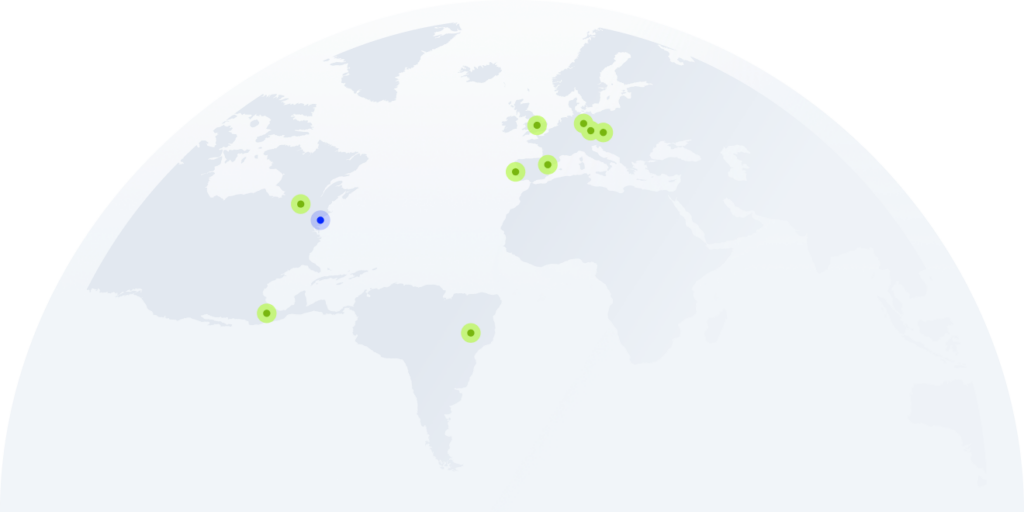What Is a Cloud PBX? How It Works and Benefits

82% of businesses reported cost savings after moving to the cloud.
But saving money is just one advantage.
Cloud PBX is changing the way businesses communicate. By using the internet instead of traditional phone lines, it provides unmatched flexibility, scalability, and efficiency.
In this article, you will learn more about how Cloud PBX can transform your business communications. We’ll explore what Cloud PBX is, how it works, and the benefits it offers.
Key Takeaways:
- Cloud PBX (Private Branch Exchange) is an internet-based phone system that uses VoIP technology to route calls through the cloud rather than relying on traditional, on-site hardware.
- Cloud PBX provides many benefits for businesses, such as saving money on hardware and maintenance, allowing easy adjustments to user numbers and features, and offering the flexibility needed for supporting remote workers.
- Before switching to Cloud PBX, evaluate providers for essential features and integrations, ensure a stable internet connection for optimal call quality, and explore advanced features.
What Is a Cloud PBX?
A cloud PBX, or virtual PBX, is a phone system that operates over the internet rather than using physical wires and equipment. It manages calls on cloud servers instead of having a physical phone exchange in the office. This way, employees can make and receive calls from anywhere via the internet, using their phones, computers, or mobile apps.
Start calling with a complimentary virtual phone number for 14 days free!
How Does Cloud PBX Work?
A cloud PBX is a phone system that uses VoIP technology, allowing you to make calls over the internet. It is hosted on servers in the cloud instead of the physical workplace. When a call is made or received, it is routed via the Internet (IP network) to the cloud. There, the service provider processes it in their data center before directing it to the recipient. As you only need the internet for the calls, you can use different devices to make them, such as computers, laptops, smartphones, or even tablets.
Cloud PBX vs Traditional PBX: Key Differences
Here’s a table comparing the main differences between traditional PBX and cloud PBX systems:
Aspect
Traditional PBX
Cloud PBX
Infrastructure
Requires physical hardware installed on-site.
Operates over the internet, eliminating the need for on-site hardware.
Cost
Involves significant upfront costs for purchasing and installing hardware.
Typically follows a subscription-based model with lower initial costs. Maintenance and updates are handled by the provider, included in the subscription fee.
Scalability
Scaling up requires purchasing additional hardware and can be a complex process.
Easily scalable. Adding or removing users and features can be done quickly through the provider’s web interface.
Maintenance and Management
Requires in-house IT staff for maintenance, troubleshooting, and upgrades. Physical adjustments to the hardware are often necessary.
Managed by the service provider, including updates and troubleshooting. This reduces the burden on in-house IT staff.
Features and Flexibility
The system is not very flexible because it relies on the hardware and software at the location.
It offers a wide range of advanced features. The provider updates these features regularly.
Remote Work and Accessibility
Constrained to the physical location of the hardware. Remote access can be challenging and often requires additional configurations.
Accessible from anywhere with an internet connection, supporting remote and distributed workforces.
Reliability and Downtime
Vulnerable to physical damage and local power outages, which can lead to downtime.
Typically more resilient, with built-in redundancies and disaster recovery options provided by the hosting service.
What Are the Benefits of Cloud PBX?
#1 Achieve Scalability
A lack of scalable software solutions could cost businesses between 8% and 28% in revenue losses. Therefore, scalability and by extension flexibility, are essential to avoid these negative consequences.
Let’s have a look at how traditional and cloud-based PBX solutions compare in this regard.
Traditional on-site PBX systems offer little flexibility, forcing you to adapt your business to the system. Making changes, like adding features or users, takes time and effort.
Conversely, cloud-based PBX platforms offer maximum flexibility, as they only require an internet connection. Consequently, your team can work from anywhere with internet access using any preferred device. Moreover, cloud-based PBX platforms let you easily add new phone lines, features, or seats without additional physical installations. This means you can quickly adapt to changes in your business, whether there is an increase or decrease in workload.
#2 Ensure Reliability
Even though on-premise systems are known for reliability, cloud-based platforms are equally dependable, often with 99.99% uptime.
Reputable cloud PBX providers have multiple data centers in different locations, ensuring continuous service even if one center fails. For example, CloudTalk has centers in nine global locations–so even if one of them is down or the call quality drops below a specified range, our platform will simply switch to one of the other available servers without you even noticing.
#3 Get Rid of Maintenance
A great advantage of cloud platforms is that you don’t need extra hardware—employees can use laptops, mobile devices, or smartphone apps.
With an on-site PBX system, you have to call a technician whenever a problem occurs or ask your IT team to maintain the devices, cables, and everything else related to the system. Both options are costly. Now, your IT team can focus on their other duties.
As a bonus, you will have access to all of the new system’s features and capabilities right after the software is implemented, with no technician needed and no extra fees.
Manage Calls Anywhere with Cloud PBX
#4 Enhance Security
94% of businesses saw an improvement in security after switching to the cloud.
Cloud PBX providers know how to make their servers impenetrable and keep your data safe and sound.
Besides regularly running security tests and patching any possible flaws in their systems immediately, the data inside them is fully encrypted—and the same goes for your calls.
If you use strong passwords and data encryption, there’s little risk of someone eavesdropping on your calls or gaining access to your personal data. Nevertheless, if you want to go the extra mile, you can set up a hybrid cloud security solution for proper encryption and safety.
#5 Reduce Costs
Here is why using cloud PBX can save you money and keep your wallet happy:
- Eliminate wire installation: No wiring installation is needed, significantly reducing costs. You save on installation and maintenance expenses without the need for office-wide wiring. Instead, simply install the software, create an account, and configure the PBX options.
- Use existing devices: No need to purchase new devices; use your current office computers and phones.
- Lower international calling fees: VoIP eliminates lost-distance calling costs, allowing for unlimited international calls.
- Add features easily: Add features, seats, or phone lines in just a few minutes, reducing downtime and preventing the need for costly technician visits.
- Cut maintenance expenses: The provider handles all maintenance, repairs, and updates.
#6 Save Time
Apart from saving money, you also save time. Here’s how:
- Set up quickly and easily: With a cloud PBX, you can get started almost immediately by installing an app on your computer.
- Eliminate maintenance concerns: Using a cloud PBX saves time by eliminating the need for server maintenance and equipment upgrades. The provider handles these tasks, freeing you from scheduling, installation, and troubleshooting.
- Scale instantly: Adding new phone lines is quick and easy, taking just minutes. Everything is done through software, so you don’t need to coordinate with technicians, saving time and effort whether you need one line or 30.
- Access 24/7 technical support: Many cloud PBX providers offer technical support available 24 hours a day. They ensure any issues are quickly resolved which helps you avoid service interruptions.
#7 Enjoy Advanced Features
The main thing you notice when comparing your current systems with cloud-based PBX is the features. Many of them are also available right away, without extra charges.
Here are some useful cloud PBX features:
- Call Recording: Through cloud platforms, you can automatically record and store all of their phone calls. This ensures that agents don’t miss a single detail from their customer interactions. It’s also a great tool for managers to monitor current agents’ performance and train new ones.
- IVR Menu: Helps your customers find the right agents for their issues by guiding them through different options. It also routes them to the correct departments and allows them to find required information, such as office hours or order status.
- Voicemail Transcription: Any voicemail you receive can be automatically transcribed and sent to your email inbox as a text file.
- Reporting and Analytics: Cloud PBX platforms have many analytical tools that allow companies to keep track of the critical business metrics. For example, call center managers can quickly check the daily number of answered or missed calls, amount of time spent on a call, number of calls answered by each agent, etc.
How to Choose the Perfect PBX Provider
By now, it’s likely you’re convinced of the advantages of cloud PBX. However, with so many providers to choose from, deciding can be tough. If you’re unsure, follow these steps to find the best option:
- Evaluate features vs. cost: Ensure that your chosen software provides all necessary features for your business at a reasonable cost.
- Check scalability: Ensure that the PBX system can scale with your business. For example, verify that the provider offers flexible pricing that lets you easily add or remove users and features as your needs evolve.
- Evaluate integration and customization: Check if the PBX system can integrate with other business tools, such as CRM software. For example, if you use tools like HubSpot or Salesforce, visit the provider’s website to see if they offer integration.
- Evaluate the user interface: A user-friendly interface with clear labels and simple navigation is essential for smooth operations.
Enhance your business with high-quality global communication
Enjoy the Ease of the Cloud
In today’s world of remote work, a traditional PBX system can be an obstacle. Switching to a cloud-based PBX might seem daunting at first, but you’ll see how much more user-friendly it is compared to your on-premise setup.
If you have questions about upgrading, try a demo with CloudTalk. We’ll guide you through the process so you can focus on using your new cloud PBX while we take care of the rest.
Sources
FAQs
What is the difference between cloud PBX and hosted PBX?
Cloud PBX is a phone system entirely managed online by a provider, allowing for easy scaling and remote access. On the other side, hosted PBX also uses the internet but relies on physical equipment at the provider’s location. Both reduce on-site hardware needs, but cloud PBX is generally more flexible and cost-effective. Hosted PBX may require more maintenance due to its physical components.
How much does a cloud PBX phone system cost?
Cloud PBX systems typically cost $20 to $50 per user per month, with pricing based on user count and features. Additional costs may include smartphone apps, call recording, and number porting, but cloud PBX generally offers cost savings over traditional systems. Costs are influenced by user numbers, internet needs, and hardware, with lower upfront costs compared to on-premise systems. Businesses should evaluate needs, compare providers, and consider both immediate and long-term costs for the best solution.
Is cloud PBX the same as VoIP?
Cloud PBX and VoIP are related but different. VoIP is the technology that allows for making calls over the internet. Cloud PBX uses VoIP to provide a full phone system with features like call routing and voicemail, managed by a provider without needing on-site hardware. While VoIP can be standalone, Cloud PBX offers a more comprehensive solution using VoIP.
Does cloud PBX provide good call quality?
Yes, cloud PBX can provide good call quality, but it depends on several factors. A stable and high-speed internet connection is crucial for maintaining clear voice quality. The call quality can also be influenced by the service provider’s infrastructure and the quality of VoIP technology used. With proper network setup and a reliable provider, cloud PBX can offer excellent call quality comparable to traditional phone systems.
Which is the best cloud PBX provider for small businesses?
CloudTalk is an excellent cloud PBX provider for small businesses due to its ease of setup, cost-effectiveness, and scalability. It offers advanced features like AI tools, supports remote work, and integrates with existing business tools to boost productivity.
Moreover,CloudTalk provides affordable pricing, starting at $25 per month, 24/7 customer support, and strong security measures, making it ideal for small businesses looking to enhance communication and operational efficiency. Its built-in analytics and reporting also help businesses make data-driven decisions and scale effectively.
Is cloud PBX the same as UCaaS?
Cloud PBX and UCaaS are related but not the same. Cloud PBX focuses on providing traditional phone system features like call routing and voicemail over the internet. In contrast, UCaaS (Unified Communications as a Service) offers a broader range of communication tools, including video conferencing, instant messaging, and collaboration platforms. While cloud PBX is a component of UCaaS, UCaaS provides a comprehensive suite of unified communication services beyond just voice calls.

















